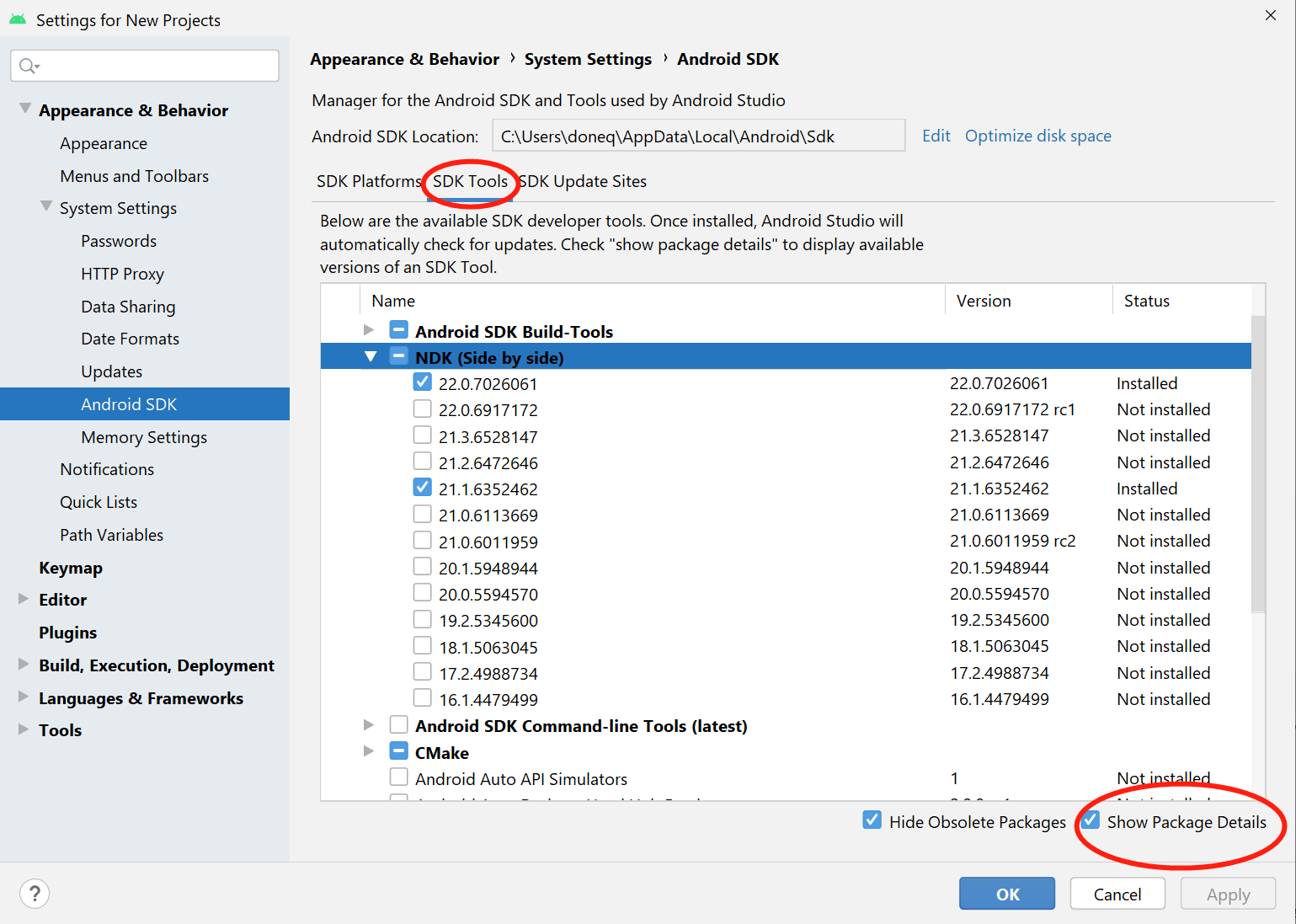Is there a means to find the ndk revision number ideally from the cmd line or from within android studio?
My use case is android studio has run an update, replaced ndk-bundle with the latest version and I want to be able to find out what revision no. that is. i.e. r10d, r11a etc.
UPDATE
~/Android/Sdk/ndk-bundle/CHANGELOG.md looks like this - I can't see an explicit reference to the revision number, can you? maybe its just 11 but they usually have a letter as well?
Changelog
=========
Report issues to [GitHub].
[GitHub]: https://github.com/android-ndk/ndk/issues
NDK
---
* Removed all sysroots for pre-GB platform levels. We dropped support for them
in r11, but neglected to actually remove them.
* Exception handling when using `c++_shared` on ARM32 now mostly works (see
[Known Issues](#known-issues)). The unwinder will now be linked into each
linked object rather than into libc++ itself.
* Default compiler flags have been pruned:
https://github.com/android-ndk/ndk/issues/27.
* Full changes here: https://android-review.googlesource.com/#/c/207721/5.
* `-fno-limit-debug-info` has been enabled by default for Clang debug builds.
This should improve debugability with LLDB.
* `--build-id` is now enabled by default.
* This will be shown in native crash reports so you can easily identify
which version of your code was running.
* `NDK_USE_CYGPATH` should no longer cause problems with libgcc:
http://b.android.com/195486.
* `-Wl,--warn-shared-textrel` and`-Wl,--fatal-warnings` are now enabled by
default. If you have shared text relocations, your app will not load on
Marshmallow or later (and have never been allowed for 64-bit apps).
* Precompiled headers should work better:
https://github.com/android-ndk/ndk/issues/14 and
https://github.com/android-ndk/ndk/issues/16.
Clang
-----
* Clang has been updated to 3.8svn (r256229, build 2690385).
* Note that Clang packaged in the Windows 64 NDK is actually 32-bit.
* `__thread` should work for real this time.
GCC
---
* Synchronized with the ChromeOS GCC @ `google/gcc-4_9` r227810.
* Backported coverage sanitizer patch from ToT (r231296).
* Fixed libatomic to not use ifuncs:
https://github.com/android-ndk/ndk/issues/31.
Binutils
--------
* "Erratum 843419 found and fixed" info messages are silenced.
* Introduced option '--long-plt' to fix internal linker error when linking huge
arm32 binaries.
* Fixed wrong run time stubs for AArch64. This was causing jump addresses to be
calculated incorrectly for very large DSOs.
* Introduced default option '--no-apply-dynamic' to work around a dynamic
linker bug for earlier Android releases.
* NDK r11 KI for `dynamic_cast` not working with Clang, x86, `stlport_static`
and optimization has been fixed.
GDB
---
* Updated to GDB 7.11: https://www.gnu.org/software/gdb/news/.
Known Issues
------------
* This is not intended to be a comprehensive list of all outstanding bugs.
* x86 ASAN still does work. See discussion on
https://android-review.googlesource.com/#/c/186276/
* Exception unwinding with `c++_shared` still does not work for ARM on
Gingerbread or Ice Cream Sandwich.
* Bionic headers and libraries for Marshmallow and N are not yet exposed
despite the presence of android-24. Those platforms are still the Lollipop
headers and libraries (not a regression from r11).
* RenderScript tools are not present (not a regression from r11):
https://github.com/android-ndk/ndk/issues/7.
* r12 will most likely not work with Android Studio/Gradle right away. The
Gradle plugin will need to be updated to match the build changes we made in
`ndk-build`.
* We've regressed on http://b.android.com/41770.

